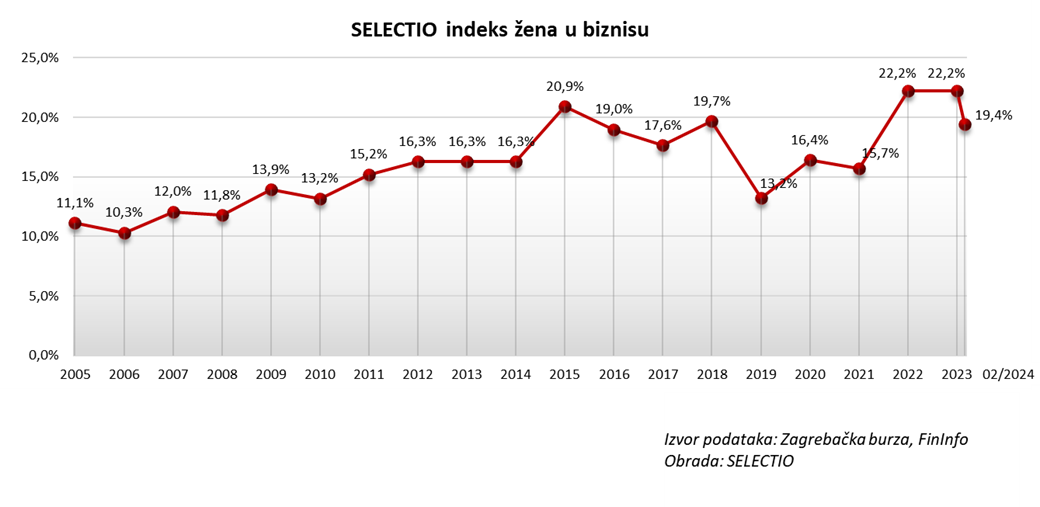The SELECTIO index, which has been measuring the share of women on company boards as part of the CROBEX index for the last 20 years, is 19.4% in 2024, recording a decline compared to 22.2% in the same period in 2023.
For comparison, the representation of women on company boards of the 350 most important companies on the London Stock Exchange according to the data of The Female FTSE Board Report for 2023 is 40% and shows a growing trend. According to data from the European Institute for Gender Equality from 2023, the share of women on company boards of the most important companies listed on stock exchanges in the European Union is 34.7%, and it also shows a growing trend.
Failing number of companies with women as board presidents
The number of companies with women as board president in the CROBEX index decreased from four to three companies compared to last year. The companies with women as board presidents are Shipyard Viktor Lenac d.d. and Ericsson Nikola Tesla d.d., where a woman board president is also the only member of the board, and Podravka d.d. in which women make up 40% of the board.
Raising number of companies that do not have women on the board
The percentage of companies, constituents of CROBEX, that do not have a single woman on their boards, the so-called zero companies, increased by 11.7 p.p. compared to last year. There are currently 45% of such companies in CROBEX. For comparison, of the 100 most important companies on the London Stock Exchange, 94% of them have at least one woman on the board.
The representation of women in politics according to the current convocation of the Parliament shows a slight decrease compared to last year and makes 32.7%, which is comparable to the share of women in the politics of European Union countries (33%). The representation of women in science has slightly increased compared to last year, measured by the share in the regular membership of HAZU (12.1%).

The Pay Gap Paradox
Educational attainment significantly affects pay levels, with higher education correlated with higher earnings. However, the pay gap paradox is evident in almost all EU member states: women tend to have higher levels of education than men but are still underrepresented in better-paid executive positions, including board and executive board appointments.
Will the introduction of the EU Directive improve the situation?
Two years ago, the European Union passed the Directive on Gender-Balanced Boards, which requires listed companies to ensure that an underrepresented gender - usually women - has at least 40% of supervisory board appointments or at least an average of 33% of all supervisory or executive board positions. The goal is to establish transparent recruitment processes within the company, ensuring that if candidates have the same qualifications, the candidate of the less represented gender is preferred.
"According to McKinsey research, Croatia can increase its GDP by four billion euros a year until 2030 through greater participation of women in management positions, but we will not reach these figures if we do not introduce measures that will encourage and support women to get involved in management, and we can do that introducing quotas or goals for the representation of women, encouraging and mentoring them, ensuring flexible working hours and work-life balance, and promoting a culture of equality", said Aleksandar Zemunić, Director of SELECTIO Group.
Companies with the Employer Partner certificate, now about a hundred of them, already have on average 41% of women in management positions and 49% of women in the talent pool. Also, the share of women on boards of companies awarded the Employer Partner certificate is 25.9%. Companies that stand out the most are Poslovna inteligencija d.o.o. and TRS d.d. with 100% representation of women on board, Pliva Hrvatska d.o.o. with 75% representation, and Zagrebačka pivovara d.d. and Zvijezda plus d.o.o. with 66.7% representation.
Also, through the Employer Partner project, more than 20,000 HR system evaluations were carried out in some of the most successful organizations in Croatia, and a positive impact was achieved on over 200,000 employees in the region.
Introduction of the Equal Pay Champion certificate
This year’s news is the introduction of the Equal Pay Champion certificate, which SELECTIO Group gives to the companies that are recognized for leading the way towards equal pay. This certificate represents the first step towards equality. On March 15, at the ceremonial awarding of the first certificates, which will be held in Zagreb, we will find out who are the first Equal Pay Champion organizations in Croatia.
"We know that creating an equally valued workplace can be challenging, and that's exactly why we offer help along the way. Equal Pay Champion is open to applications from all companies, regardless of size and type of activity. The goal of the certificate is to recognize organizations that are pioneers in achieving gender equality and encourage others to make positive changes in their internal policies," explained Lara Šubić Šuša, head of the Equal Pay Champion project launched by SELECTIO Group.
More about the EU Directive: Closing the Pay Gap: The Role of Legislation in Achieving Gender Pay Equality



